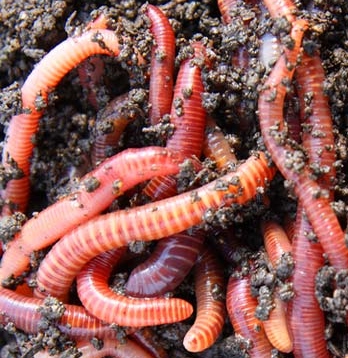Unknown Facts About Red Wiggler Express
Table of Contents4 Easy Facts About Red Wiggler Express ShownOur Red Wiggler Express IdeasAn Unbiased View of Red Wiggler ExpressTop Guidelines Of Red Wiggler ExpressA Biased View of Red Wiggler Express
And the growing Red Worm population? Also in the heap that was set up straight in front of backyard composters with existing Red Worm nests.
Numerous selections, consisting of Red Wigglers, European Nightcrawlers, and Lumbricus varieties were brought over from the European continent. But here's the thingNative or not - and as talented as they are at being able to survive in a wide-range of environments and conditions -. Simply put, they are far much more likely to hang out in any active composting systems you have actually established up, than they are to wander off and start wrecking the setting.
Origins need oxygen for respiration and rely upon smooth air movement within the soil to grow. When it rains, dirt can come to be saturated with water, minimizing the oxygen offered and impeding nutrition absorption. To maintain an optimum balance, the soil must permit water to drain pipes appropriately, leaving sufficient space for air to sustain root health
The Only Guide to Red Wiggler Express

When it involves worms for composting, what enters your mind? If you were an earthworm breeder, dealership, or simple gardener, then you would certainly know that red wiggler worms are the perfect worms for vermicomposting. To get more information regarding these planet marvels, checked out several of the red worm facts listed below.
(http://efdir.com/Red-Wiggler-Express_320644.html)If they extend their bodies, you'll be able to see the red stripes on their skin. When raising worms such as red wiggler worms, you must have the ability to know exactly how to profit them. When you're able to maintain and take care of their environment well, and likewise feed them the appropriate type of organic wastes, after that they'll be able to produce nutrient-packed and quality-rich worm castings for you (additionally referred to as worm poop or compost).
All about Red Wiggler Express
So, what do worms consume? Well, these red wriggler worms can be fed with kitchen scraps and garden wastes. Any rotting organic things will certainly do like vegetable and fruit peels, crushed egg coverings, used tea bags, coffee premises, lawn clippings, completely dry fallen leaves, and others. Make sure not to feed them foods items that are oily, citrusy, or has meat or dairy products in them.

This actions makes them fit for life in worm bins, compost heap, and various other restricted rooms where organic waste is bountiful. Creating an ideal environment for red wigglers needs a thoughtful method. Think about the following crucial elements to take care of red wigglers in the house and guarantee their health: Use a bedding of shredded newspaper or cardboard.

Include a handful of completely dry, shredded paper if the bin ends up being also wet. Indeed, they do! Red wiggler worms reproduce by laying tiny, lemon-shaped eggs in safety cocoons. These cocoons are typically transferred in the bedding and hatch into baby worms within a couple of weeks. The quick recreation cycle of red wigglers is just one of the reasons they are preferred for vermicomposting.
The Single Strategy To Use For Red Wiggler Express
Their flexibility and resilience have made them a preferred option for vermicomposting in numerous regions around the world. Think about protective measures for extremely severe temperature levels such as: Protecting the worm container with layers of straw or leaves. Red Wiggler Express.

When taking treatment of your red wigglers it is necessary to keep in mind to: 1) K.I.S.S (Keep it Simple) and 2) every little thing in moderation. These policies apply to feeding your compost worms, sprinkling your worm containers, and nearly everything else involved in looking after them. Simply keep in mind - you can always add even more food later (but it's tough to get rid of feed once it's been included to a bin!).
Due to the fact that I fed the red wigglers and garden compost worms also much, they weren't able to maintain up and over time the older food went uneaten and developed anaerobic conditions that eliminated the worms. Right here're the 6 gold policies for how usually and exactly how much to feed your worms: Guideline # 1: Small amounts!
Things about Red Wiggler Express
Leftover food will certainly lead to anaerobic problems that will certainly eliminate your real-time worms. Regulation # 6: After the first feeding, feed the worms 1/3 to 1/2 of their weight.